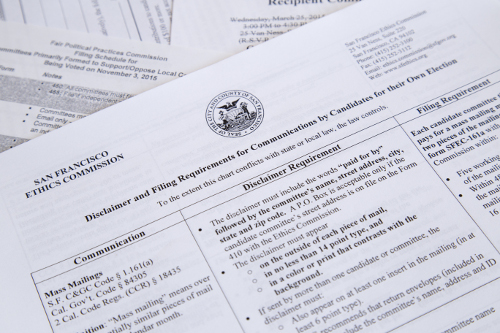Proposition C would require more people to register as official lobbyists if their behaviors merited that title, potentially increasing transparency in government.
Why is this on the ballot? 
Lobbyists personally contact city officials and try to influence their decisions. This is legal, as long as they first register with the city’s Ethics Commission and keep that department’s staff updated about whom they are lobbying. But companies, nonprofits, labor unions or individuals often pay other people to lobby on their behalf. Under current city law, the entity paying the money does not have to register with the Ethics Commission, and that leaves politicians and the public in the dark about whose agenda ultimately drives the lobbying.
According to the Ethics Commission, 64 registered lobbying firms and 94 lobbyists were “active” in 2014, the city controller reported in August 2015.
The city controller says that the number of “expenditure lobbyists” who would be required to register if Proposition C passes “is difficult to estimate, but is likely to be somewhat less than the number of contact lobbyists currently registered.”
What would it do?
Proposition C would require people or organizations to register as “expenditure lobbyists” if they paid someone else to lobby on their behalf.
Is there a catch?
Expenditure lobbyists would only have to register if they paid at least $2,500 in a single month to people who lobbied on their behalf, or for activities that directly supported that lobbying, such as researching and writing reports, or conducting public opinion polls.
Would it increase the cost of government?
According to the Ethics Commission’s own estimates, this measure would cost $560,000 in the first 10 years. That would pay for the creation and maintenance of software to track expenditure lobbyists, as well as for new staff. After the first 10 years, that new system would cost $15,000 per year to maintain.
Lobbyists subject to the registration ordinance are required to pay fees of $500 per year, a small offset to the total cost of the program.
Who officially proposed it?
The San Francisco Ethics Commission.
Who officially opposes it?
Terence Faulkner, the former chairman of the San Francisco Republican Party.
Follow the money
View all filing activity supporting or opposing the measure.
Still puzzled?
We want your questions. If you’re still wondering about how Proposition A will work or impact San Francisco, ask! Use #election2015 and our Twitter handle (@sfpublicpress) and we will do our best to get answers.
Photos by Stella Sadikin / San Francisco Public Press









